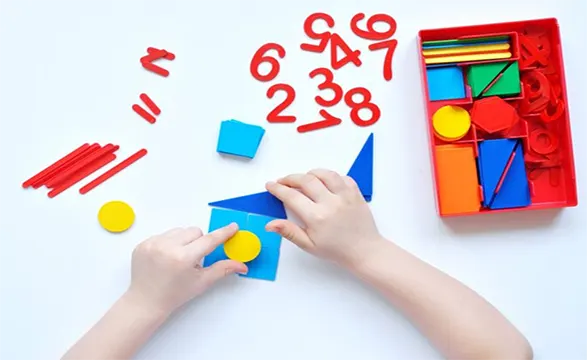Preschool Math Manipulatives
Preschool math manipulatives are hands-on learning tools designed to help young children grasp early mathematical concepts more effectively. Items such as colorful counting cubes, pattern blocks, abacus beads, and number cards allow children to visualize numbers and operations in a concrete way. By touching, moving, and organizing these materials, children build a stronger connection between abstract math concepts and real-world understanding. These resources are particularly valuable in preschool education because they transform learning into an engaging and playful activity rather than a memorization task.
Preschool math manipulatives also play a key role in developing problem-solving and critical thinking skills. With tools like linking cubes or bead strings, children can experiment with grouping, comparing, and sequencing numbers, which naturally enhances logical reasoning. They may build patterns, measure lengths, or practice addition and subtraction through games and challenges that feel fun and interactive. This process not only strengthens mathematical foundations but also supports fine motor skills, hand–eye coordination, and sustained attention. Moreover, manipulatives encourage cooperative play, as children often work together in small groups, sharing ideas and strategies. This collaborative environment nurtures both social and cognitive development, making manipulatives an essential bridge between playful exploration and structured learning.
Best Math Manipulatives for Preschool
The best math manipulatives for preschool help children explore numbers in ways that feel natural and exciting. At this stage, abstract ideas can be difficult to understand, so giving children real objects to touch, count, and arrange provides an important bridge. With these resources, children can practice essential skills while developing confidence and curiosity toward mathematics.

Manipulatives work especially well when children are learning operations like addition and subtraction. By physically combining or separating objects, young learners can see how numbers grow or shrink, which builds strong conceptual understanding. Teachers and parents find these tools useful because they can adapt them to many activities, from counting exercises to problem-solving games.
- Manipulatives for preschool such as counting bears, rods, or beads encourage grouping, sorting, and comparing.
- Unifix cubes are a favorite because they can snap together and pull apart, allowing children to represent equations visually.
- Tools like number cards or ten-frames add structure to lessons, reinforcing early number sense.
Beyond math skills, manipulatives also support fine motor development and logical thinking. As children snap, stack, and organize items, they build patience and persistence. This hands-on approach not only makes math engaging but also gives children the confidence to explore more complex concepts later on.
Math and Manipulative Activities for Preschoolers
Math and manipulative activities for preschoolers provide opportunities to learn by doing. Children at this age are active and imaginative, so lessons that involve movement, exploration, and creativity capture their attention more effectively than traditional memorization. These activities connect everyday play with important early learning outcomes.
Engaging in structured yet playful tasks helps preschoolers understand key math concepts such as sequencing, grouping, and comparing. For instance, building towers or arranging puzzles encourages logical reasoning while still feeling like fun. Teachers can design games that involve counting, sorting, or measuring, ensuring children discover math naturally.
- Math manipulatives like abacus beads, pattern blocks, or number rods create concrete ways to practice counting and problem-solving.
- Hands on math tasks, such as stacking cubes, matching objects, or arranging shapes make lessons interactive and memorable.
- Activities with blocks, cards, or beads allow children to test ideas and share their strategies with peers.
One of the greatest strengths of manipulative activities is adaptability. They can be made simple for beginners or more challenging as children progress. By combining fun with exploration, these activities help build persistence, teamwork, and confidence qualities that prepare children for future success in mathematics.
